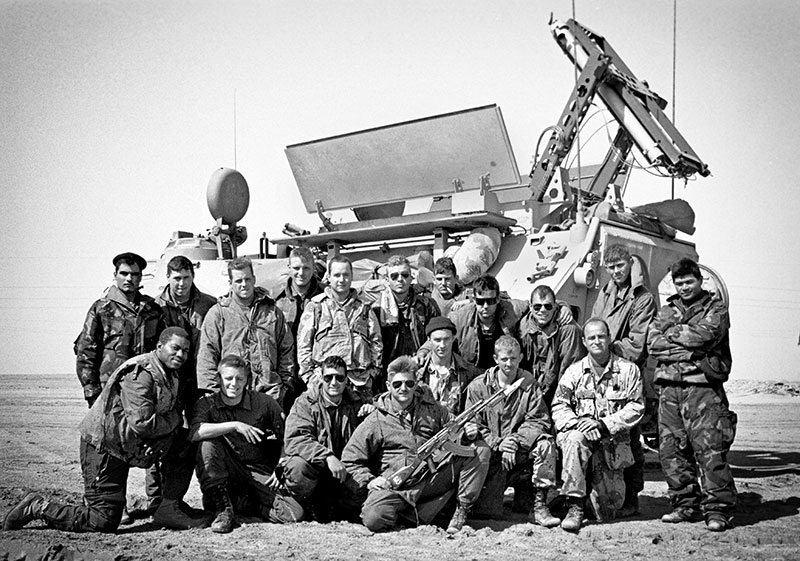
Vanderbilt photographer Joe Howell was a student at the University of Tennessee and a U.S. Marine Corps reservist in August 1990, when Iraqi leader Saddam Hussein invaded the neighboring oil-rich nation of Kuwait.
Led by the United States, coalition forces from 34 countries declared war on Iraq, and Howell’s reserve unit—comprising Marines from the Knoxville area, many of whom also were college students—was called to duty. They spent that Christmas training at North Carolina’s Camp Lejeune and were in the Persian Gulf region by New Year’s Day 1991.
“[rquote]Going over there, we didn’t really know what we were getting into,” Howell remembered.[/rquote] “We knew we’d be fighting a large and experienced army, and the fact that Saddam had chemical weapons was another big concern—we did a lot of training for that.”
This Feb. 24 marked the 25th anniversary of the start of ground assault operations for Desert Storm, the combat phase of the Persian Gulf War. Howell, a combat engineer, was on the front line of forces advancing from Saudi Arabia into Kuwait—a perilous mission considering the Iraqi Army had buried thousands of land mines in the desert along the Kuwaiti border.
Howell’s unit used assault amphibious vehicles (nicknamed “amtracks” by the Marines—a combination of “amphibious” and “tractor”) outfitted with MK-154 triple-shot line charge systems to clear lanes within the minefields. A rocket on the amtrack would fire a line of C-4, which would be detonated remotely after it hit the ground. If the C-4 didn’t detonate as designed, Howell’s job was to run to the line of explosives and set it off by hand using blasting caps and a timing fuse. “Our job was to get the M1A1 Abram battle tanks to Kuwait city,” he explained.
Howell and his fellow Marines found an Iraqi Army that was significantly outmanned.
“We were fighting an enemy that had been fighting Iran for a long time, so we thought we were coming up against these war-hardened veterans,” he said. “[lquote]What we really came up against were guys who were war-weary.[/lquote]
“We had total domination of the air; we had total domination of communication,” said Howell of the U.S. and coalition forces. “Technologically, our side was much more advanced. We used GPS and night vision, which were new technologies back then.”
Almost immediately, Howell’s unit encountered surrendering Iraqi soldiers by the thousands. Although bombing lasted for several more weeks, American troops declared Kuwait liberated just 100 hours after the ground attack began. Howell and his fellow Marines ended up in the desert outskirts of Kuwait City, where they stayed for several months.
At the time an aspiring photographer, Howell took his camera with him to the battlefield and trained his lens on the men and machinery around him. He shot thousands of images and sent the film back to his mother in Knoxville—U.S. troops could mail anything home for free—in empty MRE (Meal, Ready-to-Eat) containers.
Howell’s mother turned the photos over to the Knoxville News-Sentinel, which published his work. Upon returning home, staff at the newspaper encouraged him to pursue a degree in photojournalism. He did so at Western Kentucky University, graduating with minors in political science and history in 1995. He would go on to earn a Master of Liberal Arts and Science degree with a certificate in Creative Arts from Vanderbilt in 2013.
Howell remained an active Marine Corps reservist for about a year following his Gulf War service. He’s worked as a photographer at newspapers in several states, including 14 years at the News-Sentinel, and traveled to more than 50 countries, taking pictures along the way. He joined the photo staff of Vanderbilt’s Creative Services office in 2008.
Howell and the Marines from his unit plan to reunite in Knoxville this weekend to mark the 25th anniversary of Operation Desert Storm.